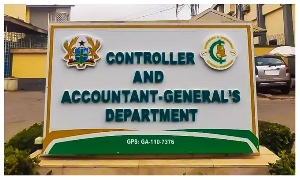Akosombo (E/R), Nov. 28, GNA - President John Agyekum Kufuor on Friday asked the Ghana Investors' Advisory Council (GIAC) to bring innovative ideas that would attract domestic and foreign investments to achieve economic growth in Ghana.
He said the current economic growth rate of 4.5 per cent per annum should move to the range of 8.0 to 8.5 per cent per annum for the next 10 years in order to achieve the Government's vision of a per-capita income of 1,000 dollars.
President Kufuor was addressing the Fourth Council meeting at Akosombo.
The Council was inaugurated in May 2002 to advise the President on issues that were hampering the promotion of Ghana as the preferred destination for both domestic and foreign direct investments in the West Africa Sub-Region.
It is a small, high level and informal advisory group, chaired by President Kufuor and made up of top-level corporate executives, who assist in increasing understanding between the Government and companies driving investments.
The Council include a 30-member group of top-level executives of foreign and Ghanaian businesses such as CMS Energy Company, ECOBANK, Heinekens, Ashanti Goldfields Company (AGC) as well as individuals from the private sector.
President Kufuor said to achieve the set targets, Government had decided to renew their membership for another two years, adding, "let us together, take forward the great work we have began to make Ghana the best and most preferred location for both domestic and foreign investments in Africa.
"This august body has entered into a social contract with my Government to remove the bottlenecks that constrain investments in Ghana. It is my hope that those of you with investment in Ghana will increase your stake and others will make that ultimate decision soon", he said.
President Kufuor, who gave an overview of the economy, said for the first time in the nation's history revenue targets for this year was exceeded by over 900 billion cedis by the end of September and Parliament approved more funds for development projects.
He said the Government's target was to achieve by the end of the year, Gross International Reserves cover for imports of goods and services of 2.3 months but by the end of September; however, reserves of up to 1.012 billion dollars that would cover 3.4 months had been achieved.
"This is very significant considering that on assumption of power in 2001, Ghana's gross annual reserve stood at only seven days", he said.
President Kufuor said an overall budget deficit of 2.7 per cent of Gross Domestic Product (GDP) was targeted by the end of the year but the Government succeeded in achieving a deficit of only 0.6 per cent of GDP so far and it was anticipated that it would go down further by the end of the year to indicate that the Government had done better.
He said there had been relative stability of the value of the cedi against all major currencies and against the US dollar there had been slight depreciation of only 3.5 per cent by the end of September.
In the mining sector, President Kufuor said the merger between Anglogold and Ashanti Goldfields was expected to bring investments of over 500 million dollars and make the new company the biggest gold mining company in the world.
He said Newmont Company of the US the current biggest gold mining company in the world was investing over 400 million dollars in three mines in the Eastern and Brong Ahafo Regions.
President Kufuor said existing mining companies were also investing citing Goldfields Ghana that was investing over 160 million dollars from its own resources in their Tarkwa and Daman mines next year.
This would raise their investment from 400 million dollars to 560 million dollars.
President Kufuor said for the first time in the cocoa sector, all the financing requirements for the purchase of cocoa totalling 600 million dollars was syndicated within the country and cocoa production over the past two years had increased from 350,000 tonnes to 500,000 tonnes.
He said it was possible to reach 600,000 tonnes next year as a result of the mass cocoa spraying exercise and an increase in the producer price to 67 per cent of the world market price, from the 40 per cent of the world market price and since the Government took over in 2001 there had been five price increases.
Mr Kwamena Bartels, Minister of Private Sector Development, said the Ministry had put together a draft Medium-Term National Private Sector Strategy document to harmonise all the private sector development strategies including recommendations from the Council.
He called on the Council to support the Ministry to put in place practical programmes that had made an impact internationally in the areas of Information Communication and Technology (ICT), agri-business, agro-processing such as cashew and shea butter production and human capital development for a stronger knowledge-based economy.
Business News of Friday, 28 November 2003
Source: GNA












